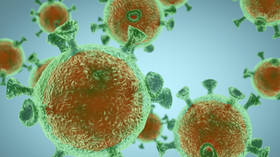Why we shouldn’t panic over the Covid Deltacron alert

An alleged hybrid mutation of the Delta and Omicron strains of the virus has raised a lot of questions about the future of the pandemic. But an increasing number of experts insist it is most probably a false alarm.
Last week, a group of scientists from Cyprus claimed they had discovered a new Covid variant – a combination of the already recognized Delta and Omicron strains. They also gave it a sinister new name, ‘Deltacron’.
But the scientific community took the story with a pinch of salt. Despite the fact that the research team claimed to have identified 25 cases of the new ‘variant’, an array of experts from across the globe insisted that lab contamination was to blame for the discovery. Professor Leondios Kostrikis, who leads the team of researchers from Cyprus, defended Deltacron in an email sent to Bloomberg. Identified cases “indicate an evolutionary pressure to an ancestral strain to acquire these mutations and not a result of a single recombination event,” he told the outlet.
However, skepticism remains high. Professor Jose Antonio Lopez Guerrero, from the Department of Molecular Biology at the Autonomous University of Madrid, told RT that contamination during research is the most likely cause. A combination of variants can occur, he said, but the chances of that happening are extremely low.
“While Omicron is so widely extended right now, it could develop some kind of mixed infections, like a mix with Delta,” he said. “But it would be a very rare case; the possibility is tiny.”
Vincent Marechal, the professor of virology at the French Sorbonne University in Paris, is also unprepared to confirm whether Deltacron is real. “It’s difficult for me, while the data is not submitted for publication, to give a scientific response [as to] whether Deltacron exists or not,” the professor said.
The verdict appears to be that it’s possible – but improbable.
The World Health Organization is yet to officially comment on the matter, but in a bid to calm widespread fears, its technical lead on Covid-19, Maria Van Kerkhove, urged people not to use the term ‘Deltacron’ as it was “likely contamination during sequencing.”
Jumping in late here: Let’s not use words like deltacron, flurona or flurone. Please 🙏These words imply combination of viruses/variants & this is not happening. “Deltacron” is likely contamination during sequencing, #SARSCoV2 continues to evolve & see flu co-infection🧵below. https://t.co/rNuoLwgCzN
— Maria Van Kerkhove (@mvankerkhove) January 10, 2022
This desire for the public to remain objective was also reflected in her request that people abstain from using terms like “flurona or flurone,” in reference to another concerning episode that emerged in media headlines at the beginning of the year. A young woman in Israel was hospitalized with both Covid and the flu at the same time. Fortunately, her symptoms were mild, so she was soon discharged from the hospital.
Her case was not the first. In 2020, there were several reports that both infections could strike at the same time. And with the headlines full of alarming-sounding new Covid strains named after letters of the Greek alphabet, the mere mention of a word like ‘flurona’ has seemingly been enough to scare many.
However, Professor Lopez clarified the situation to RT. “The case of flurona is not one disease. It’s a co-infection with two different viruses. A mix of Covid and flu cannot happen,” he said.
Professor Marechal explained the mechanism: “Recombination is a genetic process that can occur when two species are very close to each other. It’s quite comparable to sexual reproduction – you can have children with another human, but not with an animal. Influenza and coronavirus are from two different families. They cannot cross with each other.”
Even if it transpires that Deltacron is indeed a false alarm, the world still faces enough problems in dealing with Omicron, which is the current dominant strain. Due to its high transmission capacity, it’s spreading so rapidly that some states are tightening anti-Covid measures and promoting mandatory vaccination – fueling the anger of citizens opposed to such a policy. According to WHO estimates, in six to eight weeks, more than half of Europe could be infected.
“Personally, I thought that the pandemic would end with Delta,” Professor Lopez continued. “But then Omicron came and changed the rules of the game.”
But there is a glimmer of hope. Many experts across the world have noted that the symptoms caused by the latest strain are milder than those from previous variants.
Professor Marechal said, “Omicron is less virulent – or at least we hope it is – than Delta, for example. But it’s very highly transmissible, mostly because the incubation period is shorter. It’s very well designed to transmit in population with immunity. The barrier of vaccines is not as efficient as we expected – but vaccination does provide protection against hospitalization.”
Professor Lopez also pointed out that the factor of high transmission should be taken into account. “Omicron is infecting a lot of people globally, so there will be a huge number of those with natural immunity after the disease, plus those with the immunity given by vaccines. So, this high level of immune protection would work against other variants,” the professor said. “But this outcome is still a theory. In practice, there may be another variant, worse than Omicron, and we all would be back to square one.”
While that is undeniably a concerning prospect, the apparent confirmation that a hybrid mutation like Deltacron is unlikely will be a relief to millions. But the experts are taking nothing for granted.
Professor Marechal concluded, “We can’t predict anything: we have to learn not to predict, because most of the predictions that have been done regarding Covid have proved to be false.
“But, as a virologist, I think that a lot of people will be infected, and this immunity will probably decrease the risk of severe cases. It’s not the fact that we will not have a new wave – it’s more the fact that it will be not so important for the health system.”
The statements, views and opinions expressed in this column are solely those of the author and do not necessarily represent those of RT.













